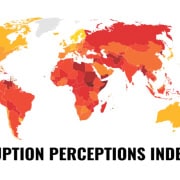|
Getting your Trinity Audio player ready...
|
By Kwazi Dlamini
American actor and humanitarian George Clooney has joined forces with Refinitiv, a global financial data provider, to clamp down on African war criminals laundering the proceeds of war crimes through the international financial systems. In effect, the Clooney Foundation for Justice – through its strategic partner The Sentry – will work with Refinitiv to identify and track dirty money related to the continent’s war criminals.
Comprised of financial investigators, international human rights lawyers, regional experts, former law enforcement agents, intelligence officers, policymakers, investigative journalists, and banking professionals, The Sentry describes itself as an investigative team that trails dirty money connected to war criminals, specifically in Africa. Refinitiv, meanwhile, is one of the world’s largest providers of financial markets data and infrastructure, used among other purposes for due diligence exercises.
Africa is known for its numerous atrocities committed through wars. The continent continues to struggle with unabated acts of terrorism, rising insurgency and well-funded mercenaries – but the unity between The Sentry and Refinitiv will work to prevent future atrocities, by cutting off those profiting from them.
The Sentry tracks and analyses how these violations of human rights are financed. Refinitiv will further process the data and share with relevant governments to put sanctions on private companies and entities connected to those companies. It will also disseminate the data to over forty thousand institutions that it serves, in 190 countries.
“To help prevent future mass atrocities, the public and private sector must target the financial infrastructure enabling armed violence and grave human rights abuse,” said Megha Swamy, deputy director of Illicit Finance Policy at The Sentry. “By integrating our data with World-Check, we’re getting closer to targeting those responsible for fuelling war and mass atrocities where they are most vulnerable – their money.”
The immense volume of hard-to-obtain information which The Sentry will add to Refinitiv’s World-Check Risk Intelligence tool will provide companies with options on whom they conduct business with, in respect to money laundering and financing of armed conflicts, thus helping them to make informed decisions and comply with regulatory obligations. This will also protect companies from being complicit in financial crimes.
The mercenary life
Mercenaries or private military contractors are often deployed in African countries to train local militants or for peacekeeping missions; however, there have been many allegations of human rights violations against them including torture, rape and killing of civilians. A distressing CNN and The Sentry investigation into allegations of war crimes against Russian mercenaries stationed in the Central African Republic (CAR), reveals a rogue unit of militants who kill and maim without any consequences.
The Wagner Group, a private security company working with CAR president Faustin-Archange Touadéra’s regime forces, has been highlighted in the investigation as perpetrators behind war crimes in the country – targeted mainly at civilians. In recent years the group has also been active in Mozambique, among other countries.
The investigation reveals that the mercenary group has close ties to Russian politicians and in fact, well-known Russian oligarch Yevgeny Prigozhin, a man who is close to President Vladimir Putin, is believed to own Wagner; the Russian government, however, refutes claims of human rights violations. Furthermore, mercenaries are not regulated in Russia, therefore cannot be charged under any existing laws in the country.
Through this new collaboration, The Sentry is pursuing methods that will cause severe financial consequences for war criminals such as these, as well as their financial facilitators, through global sanctions – even if they escape being charged for their crimes.
Profiting from conflict zones
Rather than countries bringing in mercenaries and private security companies who at times hijack governments for self-enrichment, The Sentry wants to create new ways to maintain good governance, peacekeeping and human rights.
The US conflict minerals legislation, passed over a decade ago, is supposed to prevent companies from sourcing minerals from conflict-ridden territories. The reason for this is that companies must take the necessary precautions and work with the appropriate care – known as ‘due diligence’ – to ensure they are not funding armed groups or human rights abuses.
But research by The Sentry shows that most large jewellery, automotive and electronics companies still do not require their suppliers to source from conflict-free refiners. Before this legislation was passed, companies would claim ignorance about their independent suppliers and the source of their minerals.
According to The Sentry, the number of companies who require their suppliers to undergo independent conflict minerals audits continues to rise, though a far bigger number of companies still refuses to undertake due diligence. These companies do not require their suppliers to undergo the conflicts minerals audits, while some simply reveal very little about their refiners, especially the automotive industry.
The Sentry says while the few companies that continue to conduct audits on their suppliers deserve credit, the tide will only change when other companies decide to source minerals from conflict-free refiners. This will leave unaudited refiners out in the cold, as they will struggle to get buyers and consequently be forced to change their business practices and start undertaking due diligence.
With these structures in place, the big companies will no longer be able to support the conflict industry, and the profits wrung out of human suffering by those who fan the fires of conflict for their own evil purposes, will diminish.
The dissemination of this data will also exclude war criminals from doing business with genuine institutions, effectively locking them out of the global financial system.








